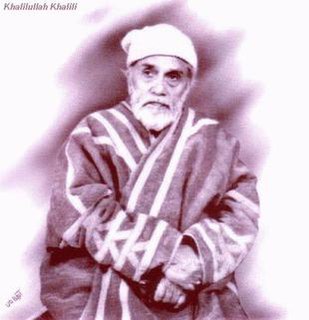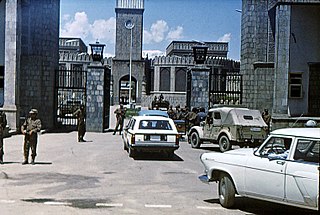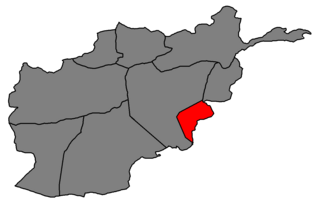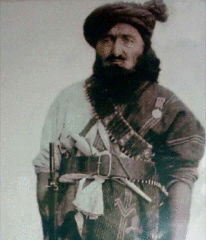Related Research Articles

Burhānuddīn Rabbānī was an Afghan politician who served as President of the Islamic State of Afghanistan from 1992 to 1996. After the Taliban government was toppled during Operation Enduring Freedom, Rabbani returned to Kabul and served as President from November to 20 December 2001, when Hamid Karzai was chosen at the Bonn International Conference on Afghanistan.
Sardar Mohammed Daoud Khan, also romanized as Daud Khan or Dawood Khan was an Afghan statesman who served as the 5th Prime Minister of Afghanistan from 1953 to 1963 and as President of Afghanistan from 1973 to 1978. Born into the Musahiban royal family, Khan started as a provincial governor in the 1930s and later a commander before he was chosen as prime minister in the monarchy of his first cousin, Mohammed Zahir Shah. Ten years after his resignation as prime minister, Khan overthrew the monarchy with the backing of Afghan Army officers and declared himself as the first President of the Afghan republic in 1973, renouncing his royal title.

The Indian independence movement was a series of historic events with the ultimate aim of ending the British rule in India. The movement spanned from 1857 to 1947.

Radio Kabul is the public radio station of Afghanistan. The name Radio Kabul has been given to many different incarnations of the state-run radio station since the first radio transmitters were installed in Kabul in the 1920s.

The Islamic Emirate of Afghanistan was a totalitarian Islamic state established in September 1996, when the Taliban began their governance of Afghanistan after the fall of Kabul. At its peak, the Taliban regime controlled approximately 90% of the country, whereas remaining regions in the northeast were held by the Northern Alliance, which maintained broad international recognition as a continuation of the Islamic State of Afghanistan. After the September 11 attacks and subsequent declaration of a "War on Terror" by the United States, international opposition to the regime drastically increased, with diplomatic recognition from the United Arab Emirates and Pakistan being rescinded. The Islamic Emirate ceased to exist on 17 December 2001 after being overthrown by the Northern Alliance, which had been bolstered by the ISAF coalition established after a U.S.-led invasion of the country two months prior.

Habibullāh Kalakāni, also known by his nickname "Bacha-ye Saqao" was a ruler of Afghanistan from 17 January to 13 October 1929, as well as a leader of the Saqqawists. During the Afghan Civil War, he captured vast swathes of Afghanistan and ruled Kabul during what is known in historiography as the "Saqqawist period". He was an ethnic Tajik. No country recognized Kalakani as ruler of Afghanistan.

Khalilullah Khalili was Afghanistan's foremost 20th century poet as well as a noted historian, university professor, diplomat and royal confidant. He was the last of the great classical Persian poets and among the first to introduce modern Persian poetry and Nimai style to Afghanistan. He had also expertise in Khorasani style and was a follower of Farrukhi Sistani. Almost alone among Afghanistan's poets, he enjoyed a following in Iran where his selected poems have been published. His works have been praised by renowned Iranian literary figures and intellectuals. Many see him as the greatest contemporary poet of the Persian language in Afghanistan. He is also known for his major work "Hero of Khorasan", a controversial biography of Habībullāh Kalakānī, Emir of Afghanistan in 1929.

Abdul Haq was an Afghan mujahideen commander who fought against the Soviet-backed People's Democratic Party of Afghanistan, the de facto Afghan government in the 1980s. He was killed by the Taliban in October 2001 while trying to create a popular uprising against the Taliban in Afghanistan in the wake of the September 11th attacks.

The Saur Revolution, also romanized Sowr Revolution, and alternatively called the April Revolution or April Coup, was a coup d'état led by the Soviet-backed People's Democratic Party of Afghanistan (PDPA) against the rule of Afghan President Mohammed Daoud Khan on 27–28 April 1978. Daoud Khan and most of his family were killed at the presidential palace. The revolution resulted in the creation of a government with Nur Muhammad Taraki as President, and was the precursor to the 1979 intervention by the Soviets and the 1979–1989 Soviet–Afghan War against the Mujahideen.
Sartōr Faqīr, also known as "Mullah Mastan or Mullah Mastana" Lewanai Faqir or Saidullah in Pashto and by the British as "The Great Fakir" or "Mad Faqir", "Mad Faqir of Swat" or the "Mad Mullah", was a Pashtun tribal leader and freedom fighter. His name Mullah Mastan translates to "God-intoxicated" as a reference to his religious convictions and his belief that he was capable of miraculous powers.
The following lists events that happened during 2004 in Afghanistan.
Istishhad is the Arabic word for "martyrdom", "death of a martyr", or "heroic death". In recent years the term has been said to "emphasize... heroism in the act of sacrifice" rather than "victimization", and has "developed...into a military and political strategy", often called "martyrdom operations". One who martyrs themselves is given the honorific shahid.

The Khost rebellion, also known as the 1924 Mangal uprising, the Khost revolt or the Mangal Revolt was an uprising against the Westernization and modernizing reforms of Afghanistan’s king, Amanullah Khan. The uprising was launched in Southern Province, Afghanistan, and lasted from March 1924 to January 1925. It was fought by the Mangal Pashtun tribe, later joined by the Sulaiman Khel, Ali Khel, Jaji, Jadran and Ahmadzai tribes. After causing the death of over 14,000 Afghans, the revolt was finally quelled in January 1925.

The Afghan tribal revolts of 1944–1947 or the Khost disturbances were a series of tribal revolts in the Kingdom of Afghanistan by Zadran, Safi and Mangal tribesmen which lasted from February 1944 to January 1947. The causes of the revolts laid in the worsening conditions of farmers, changes in conscription laws, the elimination of the power of Safi tribal leaders, Amanullah loyalism, trading monopolies, government surveillance, taxation, and poverty. The conflict began when government forces clashed with the forces of a tribal leader named Mazrak, who led the Zadran tribe in revolt. The Zadran uprising was followed by additional uprisings by the Safi and Mangal, the former of which elected their own king, Salemai. Faqir Ipi, a tribal leader from Waziristan, also fought for the restoration of former king Amanullah Khan alongside other rebels.

Mazrak Khan Zadran was a Zadran chieftain who fought against the Afghan government during the Afghan tribal revolts of 1944–1947 in order to support the restoration of King Amanullah Khan. Some sources render his first name as Mazarak or Zemarak.

Amanullah loyalism refers to several historical movements in the Kingdom of Afghanistan to restore Amanullah Khan as king of Afghanistan after he was deposed in January 1929 during the Afghan Civil War. Loyalists were sometimes referred to as Amanite. Loyalists tried to achieve this in various ways, including armed rebellions, political parties, colluding with foreign powers and assassinations. These movements were unsuccessful, and Amanullah died in exile in 1960 in Zürich, Switzerland without ever regaining control, other than a brief period of control in southern Afghanistan in the 1929 Afghan Civil War.
Salemai or Salimai was an Afghan rebel king who ruled only in the Eastern Province.
Amanul Mulk was an Afghan politician who served as the Minister of Defence under Salemai, who ruled only in the Eastern Province.

Babrak Khan was a Zadran chieftain who was the father of Saad Akbar Babrak and of Mazrak Zadran.
Amanat Lewana was an Afghan politician who served as prime minister under Salemai, a king of Afghanistan who ruled only in the Eastern Province.
References
- 1 2 Yapp, Malcolm (2001). British documents on foreign affairs: reports and papers from the foreign office confidential print. From 1946 through 1950. Near and Middle-East 1947. Afghanistan, Persia and Turkey, january 1947-december 1947. University Publications of America. p. 136. ISBN 978-1-55655-765-1.
- 1 2 Edwards, David B. (2017-05-09). Caravan of Martyrs: Sacrifice and Suicide Bombing in Afghanistan. Univ of California Press. p. 33. ISBN 978-0-520-29479-0.
- ↑ Olesen, Asta (1995). Islam and Politics in Afghanistan. Psychology Press. pp. 196, 198. ISBN 978-0-7007-0299-2.
- 1 2 3 4 5 Mason, Whit (2011-04-14). The Rule of Law in Afghanistan: Missing in Inaction. Cambridge University Press. pp. 85, 86. ISBN 978-1-139-49552-3.
- ↑ Edwards, David B. (2002-04-02). Before Taliban: Genealogies of the Afghan Jihad. University of California Press. pp. 163, 164. ISBN 978-0-520-22861-0.